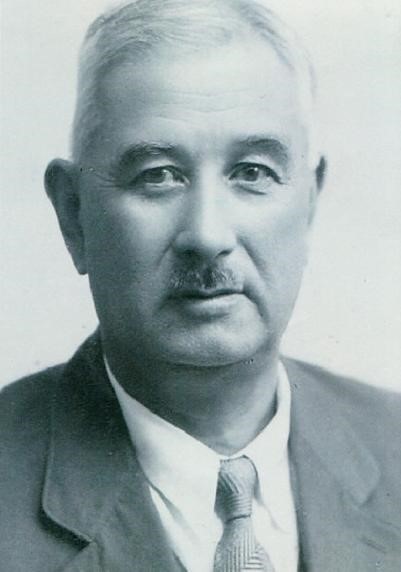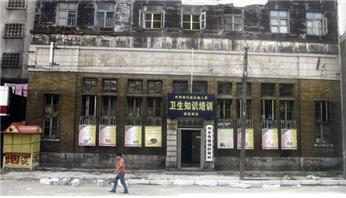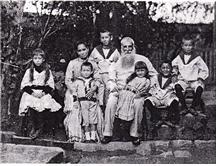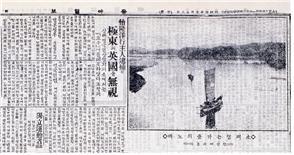[Foreigners Who Loved Korea] George Lewis Shaw, an active supporter of Korean independence movement
By Korea HeraldPublished : May 30, 2016 - 17:33
George Lewis Shaw was born as the eldest son of an Irishman, Samuel Lewis Shaw, and a Japanese woman, Ellen O’Sea Shaw in 1880 on Pagoda Island of Fuzhou, Fujian province, China. He married Saito Fumi, a Japanese woman, and the second of his two sons, Samuel George Shaw, also married a Japanese woman. Despite his father, son, and George L. Shaw himself taking Japanese wives, George L. Shaw, was far from being pro-Japanese. Instead he actively supported the Korean independence movement while running the Iryungyanghaeng trading company.
The strongly anti-Japanese Shaw
Shaw first visited Korea while working as an accountant at a Korean gold mine in around 1900, presumably at the Unsan Gold Mine in South Pyeongan Province. Shaw moved his residence to Andong (now Dandong), China in around 1907 when work at the mine stopped, as its veins were exhausted.
Here he accumulated a vast amount of wealth through transportation and trade by running a lumber mill and creating a steamship company. Afterward, the Japanese became jealous of Shaw, and sought to deport him.
The strongly anti-Japanese Shaw
Shaw first visited Korea while working as an accountant at a Korean gold mine in around 1900, presumably at the Unsan Gold Mine in South Pyeongan Province. Shaw moved his residence to Andong (now Dandong), China in around 1907 when work at the mine stopped, as its veins were exhausted.
Here he accumulated a vast amount of wealth through transportation and trade by running a lumber mill and creating a steamship company. Afterward, the Japanese became jealous of Shaw, and sought to deport him.

Meanwhile, Shaw was an active member of the British Chamber of Commerce in Shanghai which exercised great influence over British policy in the Far East. At the time, British merchants in China generally exhibited anti-Japanese tendencies as they suffered enormous losses from Japanese intervention.
Shaw also stood at the fore of the anti-Japanese product boycott movement in around 1914 in Shanghai, refusing to even engage in business transactions with the Japanese. Such strong anti-Japanese sentiments naturally engendered goodwill from the Irish Shaw to the Korean independence movement as Ireland had become a British colony.
This is well illustrated in a public statement that Shaw made to a Japanese consulate employee in Andong seeking to arrest the Korean Provisional Government’s Go Il-cheong aboard the Gyerim in mid-May 1920: “It is human nature to sympathize with the countrymen of a fallen nation, and with the independence of minor nations being a world trend, normal to give suitable advice when many Korean friends have consulted me concerning the independence movement of their country.”
Yilyungyanghaeng, the pathway to the KPG
When the KPG was established in Shanghai as a result of the March 1 Movement, Shaw was already acting as a pathway linking Shanghai with Korea through his trade ship company.
Starting with Kim Gu and his comrades boarding a Iryungyanghaeng ship in Andong for Shanghai after the March 1 movement, Shaw safeguarded Korean independence activists to the extent that there was hardly anyone among them who did not use a Iryungyanghaeng ship between Korea and Shanghai.

In May 1919, the KPG established the Andong Transportation Branch Office and Transportation Bureau within the Department of Transportation at Andong, a critical site of transportation, in order to develop communication with Korea.
The office was located in the second floor of Iryungyanghaeng, in Andong’s old downtown, Xinglong Street. That October, the Andong Transportation Branch Office changed its name to the Provisional Andong Transportation Bureau. It collected government funds, reported intelligence on Korea, conveyed government directives and documents to Korea, introduced and contacted recruits to work for the Bureau and the independence movement, and also sent Korean type, maps, weapons, ammunition, among other things, to the KPG. The bureau was able to properly function in this manner thanks to the driving force of Shaw’s dedication.
Shaw was not only generous in his support of the KPG but also in supporting Uiyeoldan, or the Righteous Patriots Corps, and other independence organizations. For example, when the Righteous Patriots Corps covertly smuggled 200 units of explosives from Shanghai into Korea, they were loaded onto an Iryungyanghaeng vessel. Thanks to Shaw, the Righteous Patriots Corps used his vessels for several years, and also took refuge in his home. In this manner, human and material resources needed for the independence movement were safely transported through Shaw’s collaboration, taking advantage of Iryungyanghaeng’s extraterritoriality rights.
Japanese governor-general orders Shaw’s arrest
Shaw was regarded as a thorn in the sides of not only the Japanese Consulate and Police Department in China, but of the Japanese Government-General in Korea. When Shaw boarded a train to Sinuiju to greet family from Japan in July 1920, the Japanese colonists judged this as a rare opportunity to weaken the independence movement, arresting Shaw under the charge that he did not possess a passport.

However, the arrest of Shaw, who enjoyed extraterritorial rights, was surrounded by heated debate in the government-general as well as related institutions. At the time, the person who issued the final decision to arrest Shaw was the Governor-General Saito. In order to exploit Shaw’s arrest as a “golden opportunity” to combat KPG activities, Shaw was considered in the same grouping as KPG cabinet members and key figures of armed independence organizations, and was accused of high treason.
As the British government, parliament, and the press saw Shaw’s arrest as an issue regarding the authority and dignity of British persons abroad in the Far East, they attached great importance to the matter and demanded his unconditional release. Moreover, the incident stirred anti-Japanese sentiment worldwide, as it directly and indirectly concerned the Western powers’ obsession with expanding concessions in China, such as the exercise of consular jurisdiction. The Japanese prime minister and leadership, seeing the gravity of the situation, personally coaxed the governor-general and in the end Shaw was released on bail after about four months, on Nov. 19. Furthermore, the bail was refunded as demanded by Great Britain, which claimed Shaw’s innocence.
Firm against colonialist deportation measures
Shaw returned to Andong in May 1921. He hired Kim Min-gyu as an Iryungyanghaeng employee and poured efforts into reviving the Andong Transportation Bureau. However, with Kim Min-gyu’s arrest in August 1922 by the Japanese, the bureau fell apart.
In mid-February 1923, Shaw went to Shanghai and urged the KPG to support the independence movement, making plans to protect and negotiate with Korean independence activists in Manchuria. Afterwards, Shaw zealously supported the independence movement by concealing independence activists in Iryungyanghaeng and conveying explosives and weapons to independence organizations such as the United Righteous Government and Righteous Government independence organizations.

With the 1931 Manchurian Incident, the Japanese illegally inspected the Iryungyanghaeng steamships in order to actively suppress Shaw, and threatened him and his wife with arrest.
Moreover, the Japanese established the semiprivate government Daean Steamship Company in a move to purchase the Iryungyanghaeng firm, pouring its efforts into detaining Shaw’s vessels. In the end, having suffered enormous losses, Shaw decided to leave Andong and established the Iryungyanghaeng head office in Fuzhou in April 1938.
Thus, Shaw’s support for the Korean independence movement and anti-Japanese activities despite all manner of suppression from the Japanese for some 31 years came to an end.
Shaw’s spirit of supporting freedom, justice
Shaw died in Fuzhou at 63 on Nov. 13, 1943, and received the Order of Independence Merit for National Foundation in recognition of his services by the Korean government in 1963. The house in Fuzhou where Shaw was born became a park. The remains of his grave cannot be found as the foreign public cemetery he was buried in was destroyed during the Cultural Revolution. However, Shaw’s goal of universal freedom, justice, and peace for mankind transcended nationality and race, and his spirit that actively supported the Korean independence movement, will not only remain in the hearts of Koreans, but forever in the hearts of people all over the world.
By Han Cheol-ho
Professor
Department of History Education, Dongguk University
In Korea’s turbulent path toward independence and nation building, there were foreign nationals who stood steadfastly by the Korean people, although their contributions have been largely overshadowed by those of Korean patriots. The Korea Herald, in partnership with the Independence Hall of Korea, is publishing a series of articles shedding light on these foreigners, their life and legacies here. This is the 16th installment. -- Ed.
-
Articles by Korea Herald




![[Herald Interview] 'Amid aging population, Korea to invite more young professionals from overseas'](http://res.heraldm.com/phpwas/restmb_idxmake.php?idx=644&simg=/content/image/2024/04/24/20240424050844_0.jpg&u=20240424200058)















![[Today’s K-pop] Kep1er to disband after 2 1/2 years: report](http://res.heraldm.com/phpwas/restmb_idxmake.php?idx=642&simg=/content/image/2024/04/25/20240425050792_0.jpg&u=)